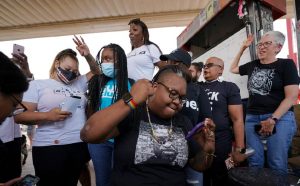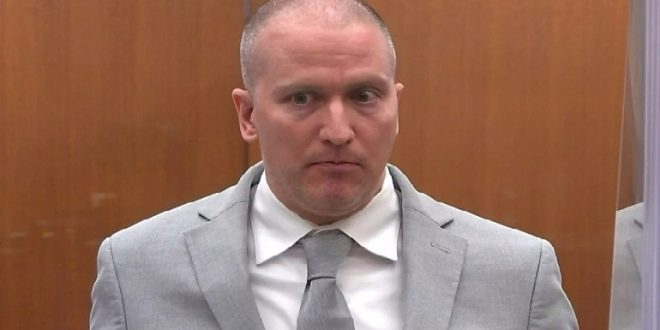26-06-2021
MINNEAPOLIS: Derek Chauvin, the white former Minneapolis police officer convicted of killing George Floyd, a Black man, was sentenced to 22 1/2 years in prison Friday.
Chauvin, 45, was convicted in April of second-degree unintentional murder, third-degree murder and second-degree manslaughter for pressing his knee against Floyd’s neck for up to 9 1/2 minutes as the 46-year-old Floyd gasped that he could not breathe and went limp.
 Bystander video of Floyd’s arrest on suspicion of passing a counterfeit $20 bill at a corner store prompted protests around the world and led to scattered violence in Minneapolis and beyond.
Bystander video of Floyd’s arrest on suspicion of passing a counterfeit $20 bill at a corner store prompted protests around the world and led to scattered violence in Minneapolis and beyond.
Judge’s justification
Following emotional testimony Friday from Floyd’s family and Chauvin’s mother, along with brief condolences from Chauvin himself, Judge Peter Cahill said the sentence was not based on emotion, sympathy or public opinion.
“I’m not going to attempt to be profound or clever because it’s not the appropriate time,” Cahill said, explaining his reasoning would be laid out in a 22-page memorandum.
“I’m not basing my sentence on public opinion. I’m not basing it on the attempt to send any messages. The job of a trial court judge is to apply the law to specific facts and to deal with individual cases.”
Prosecutors had asked for a 30-year sentence for Chauvin, who was convicted of second-degree murder. Minnesota sentencing guidelines recommended Chauvin be sentenced to 12 1/2 years, given he has no criminal record.
The 22 1/2-year sentence is 10 years more than the state’s guidelines and Cahill justified the longer sentence citing “aggravating factors”.
With good behavior, Chauvin could be paroled after serving two-thirds of his sentence, or about 15 years.
In his April ruling, Cahill found that prosecutors had shown there were four aggravating factors that would allow him to hand down a longer prison term than sentencing guidelines would dictate.
The judge agreed that Chauvin abused his position of trust and authority; that he treated Floyd with particular cruelty by kneeling on his neck for over nine minutes, even as Floyd declared “I can’t breathe”; that he committed the crime as part of a group with three other officers; and that he committed the murder in front of children.
Defence attorney Eric Nelson asked the judge to consider not only the aggravating factors, but also the mitigating factors. Chauvin did not come into this trial as a “career criminal” but lives “an honorable life”, Nelson argued to no avail.
‘Extraordinarily unusual sentence’
“For a police officer, going 10 years beyond the guidelines for this crime due to those aggravating circumstances is a pretty stiff and an extraordinarily unusual sentence,” media reported from Minneapolis.
 “It’s very rare that a police officer is charged with murder. It’s even rarer that one is convicted,” Hendren added.
“It’s very rare that a police officer is charged with murder. It’s even rarer that one is convicted,” Hendren added.
“This is the longest sentence that a police officer has ever been sentenced to in the history of the state of Minnesota,” Floyd family attorney Ben Crump said after the verdict. “But this should not be the exception when a Black person is killed by brutality by police. It should be the norm.”
Just before Crump spoke, civil rights leader Reverend Al Sharpton said the sentence “is not justice. Justice is George Floyd would be alive”.
Philip Stinson, a criminal justice professor at Bowling Green State University, told the Associated Press that 11 non-federal law officers, including Chauvin, have been convicted of murder for on-duty deaths since 2005. The penalties for the nine who were sentenced before Chauvin ranged from six years, to nine months, to life behind bars, with the median being 15 years.
Final appeals
The hearing began with prosecutors asking several members of Floyd’s family to address the court. Floyd’s 7-year-old daughter Gianna was first, appearing in a video recording.
 “I ask about him all the time,” she said in the video as Chauvin sat before the judge dressed in a gray suit and tie, a blue mask covering his nose and mouth. “My daddy always used to help me brush my teeth.” Asked what she would say to him if she could see him again, she said: “It would be I miss you and I love you.”
“I ask about him all the time,” she said in the video as Chauvin sat before the judge dressed in a gray suit and tie, a blue mask covering his nose and mouth. “My daddy always used to help me brush my teeth.” Asked what she would say to him if she could see him again, she said: “It would be I miss you and I love you.”
Floyd’s brother Terrence Floyd addressed Chauvin directly during his victim impact statement on Friday.
“What was going through your head as you had your knee on my brother’s neck?” he asked. He told the judge he wanted the maximum sentence. “We don’t want to see no more slaps on the wrist. We’ve been through that already.”
Chauvin’s mother, Carolyn Pawlenty, told the judge she would always believe her son was innocent and that her life’s two happiest moments were giving birth to Chauvin and pinning his police badge on him when he joined the Minneapolis Police Department.
“Derek has played over and over again in his head the events of that day,” she said, her voice quavering at times. “I have seen the toll it has taken on him. I believe a lengthy sentence will not serve Derek well. When you sentence my son, you will also be sentencing me.”
Chauvin himself then addressed the judge, saying he could not give a full statement due to “additional legal matters”, “but very briefly though, I do want to give my condolences to the Floyd family,” he said. “There’s going to be some other information in the future that would be of interest and I hope things will give you some peace of mind. Thank you.” (Int’l News Desk)
 Pressmediaofindia
Pressmediaofindia





